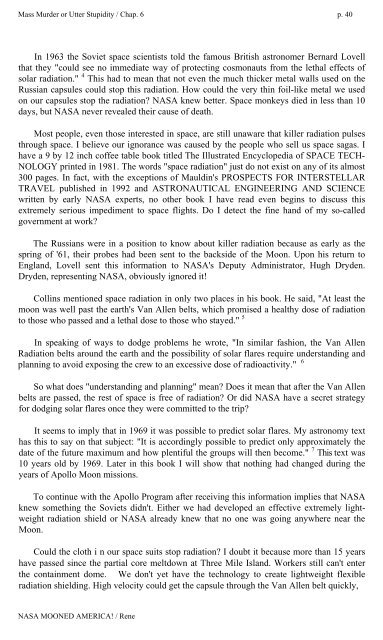Rene-NASA-Mooned-America
Rene-NASA-Mooned-America
Rene-NASA-Mooned-America
Create successful ePaper yourself
Turn your PDF publications into a flip-book with our unique Google optimized e-Paper software.
Mass Murder or Utter Stupidity / Chap. 6 p. 40<br />
In 1963 the Soviet space scientists told the famous British astronomer Bernard Lovell<br />
that they "could see no immediate way of protecting cosmonauts from the lethal effects of<br />
solar radiation." 4 This had to mean that not even the much thicker metal walls used on the<br />
Russian capsules could stop this radiation. How could the very thin foil-like metal we used<br />
on our capsules stop the radiation <strong>NASA</strong> knew better. Space monkeys died in less than 10<br />
days, but <strong>NASA</strong> never revealed their cause of death.<br />
Most people, even those interested in space, are still unaware that killer radiation pulses<br />
through space. I believe our ignorance was caused by the people who sell us space sagas. I<br />
have a 9 by 12 inch coffee table book titled The Illustrated Encyclopedia of SPACE TECH-<br />
NOLOGY printed in 1981. The words "space radiation" just do not exist on any of its almost<br />
300 pages. In fact, with the exceptions of Mauldin's PROSPECTS FOR INTERSTELLAR<br />
TRAVEL published in 1992 and ASTRONAUTICAL ENGINEERING AND SCIENCE<br />
written by early <strong>NASA</strong> experts, no other book I have read even begins to discuss this<br />
extremely serious impediment to space flights. Do I detect the fine hand of my so-called<br />
government at work<br />
The Russians were in a position to know about killer radiation because as early as the<br />
spring of '61, their probes had been sent to the backside of the Moon. Upon his return to<br />
England, Lovell sent this information to <strong>NASA</strong>'s Deputy Administrator, Hugh Dryden.<br />
Dryden, representing <strong>NASA</strong>, obviously ignored it!<br />
Collins mentioned space radiation in only two places in his book. He said, "At least the<br />
moon was well past the earth's Van Allen belts, which promised a healthy dose of radiation<br />
to those who passed and a lethal dose to those who stayed." 5<br />
In speaking of ways to dodge problems he wrote, "In similar fashion, the Van Allen<br />
Radiation belts around the earth and the possibility of solar flares require understanding and<br />
planning to avoid exposing the crew to an excessive dose of radioactivity." 6<br />
So what does "understanding and planning" mean Does it mean that after the Van Allen<br />
belts are passed, the rest of space is free of radiation Or did <strong>NASA</strong> have a secret strategy<br />
for dodging solar flares once they were committed to the trip<br />
It seems to imply that in 1969 it was possible to predict solar flares. My astronomy text<br />
has this to say on that subject: "It is accordingly possible to predict only approximately the<br />
date of the future maximum and how plentiful the groups will then become." 7 This text was<br />
10 years old by 1969. Later in this book I will show that nothing had changed during the<br />
years of Apollo Moon missions.<br />
To continue with the Apollo Program after receiving this information implies that <strong>NASA</strong><br />
knew something the Soviets didn't. Either we had developed an effective extremely lightweight<br />
radiation shield or <strong>NASA</strong> already knew that no one was going anywhere near the<br />
Moon.<br />
Could the cloth i n our space suits stop radiation I doubt it because more than 15 years<br />
have passed since the partial core meltdown at Three Mile Island. Workers still can't enter<br />
the containment dome. We don't yet have the technology to create lightweight flexible<br />
radiation shielding. High velocity could get the capsule through the Van Allen belt quickly,<br />
<strong>NASA</strong> MOONED AMERICA! / <strong>Rene</strong>


